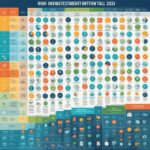Looking to maximize returns while minimizing risk? Short-term investments are the way to go. In today’s uncertain economic climate, it’s crucial to find safe places to invest your money for the short term. That’s why I’ve put together this article – to explore the best short-term investment options for September and help you achieve your financial goals.
When it comes to short-term investments, it’s all about balancing safety and returns. While long-term investments might offer higher potential gains, short-term investments provide greater stability and liquidity. Whether you’re saving up for a down payment on a house or a dream vacation, these investment options can help you grow your money while keeping it available when you need it.
Key Takeaways:
- Choose short-term investments to maximize returns and minimize risk.
- Short-term investments are ideal for specific financial goals and immediate cash needs.
- Consider high-yield savings accounts, short-term corporate bond funds, money market accounts, cash management accounts, short-term U.S. government bond funds, and no-penalty certificates of deposit for your short-term investment strategy.
- Factors to consider include risk level, liquidity, and expected returns.
- To maximize returns, diversify your portfolio, regularly review and adjust your investments, and take advantage of compounding interest.
What is a Short-term Investment?
Short-term investments are an essential part of a well-rounded financial strategy. These investments are typically made for a period of less than three years, making them ideal for individuals who have specific financial goals or need their money available in the near future. Whether you’re saving for a down payment on a house or planning a dream wedding, short-term investments can help you achieve your goals.
Unlike long-term investments that may involve higher risks and require a longer commitment, short-term investments offer lower returns but come with greater safety. They are designed to preserve capital and provide stability, making them well-suited for conservative investors. While the potential for significant gains may be limited compared to long-term investments, short-term investments can offer peace of mind and financial security.
When considering short-term investment options, it’s crucial to prioritize low-risk opportunities that align with your financial objectives. You should also take into account the level of liquidity, as short-term investments should be readily accessible when needed. To help you make informed decisions, let’s explore some of the best short-term investment plans suitable for beginners.
Balancing Risk and Reward
Short-term investments are generally considered low-risk compared to their long-term counterparts. By focusing on low-risk options, investors can safeguard their capital while still earning reasonable returns within a shorter timeframe. These investments provide an attractive starting point for beginners who want to dip their toes into the world of investing.
Short-term investments offer significant benefits for beginners, such as greater safety and liquidity. They provide an excellent opportunity to learn about investing while aiming for modest returns.
While lower returns may be a trade-off for increased safety, there are various short-term investment options available that strike a balance between risk and reward. By diversifying your portfolio and carefully selecting the right mix of investments, you can maximize your chances of achieving your financial goals.
The Importance of Liquidity
One key consideration when choosing short-term investments is liquidity, which refers to how quickly and easily you can access your funds. Given the shorter investment horizon, it is vital to have your money readily available to seize opportunities or handle unexpected expenses.
Investments like high-yield savings accounts, money market accounts, and cash management accounts are highly liquid options that allow you to withdraw your funds without significant penalties or delays. These accounts provide the flexibility you need to manage your finances effectively and respond to changing circumstances.
Best Short-term Investments for Beginners
When first starting with short-term investments, it’s crucial to choose options that prioritize safety and simplicity. Here are some of the best short-term investment plans suitable for beginners:
- High-yield savings accounts: These accounts offer competitive interest rates and are FDIC-insured.
- Money market accounts: Similar to high-yield savings accounts, money market accounts provide higher interest rates while offering check-writing privileges and easy access to funds.
- No-penalty certificates of deposit (CDs): These CDs offer a fixed interest rate and allow you to withdraw your funds before the maturity date without incurring any penalties.
By selecting these low-risk options, beginners can dip their toes into the world of investing comfortably and gain valuable experience. These investments provide a solid foundation for further exploring more advanced strategies as confidence and knowledge grow.
High-yield savings accounts
When it comes to finding safe and reliable options for short-term investments, high-yield savings accounts are a smart choice. These accounts offer higher interest rates compared to traditional savings accounts, making them attractive for those seeking high yield short-term investments. By depositing your money in a high-yield savings account, you can watch your funds grow over time.
One of the key advantages of high-yield savings accounts is their high level of liquidity. This means that you can easily access your money whenever you need it without any restrictions. Whether you need funds for an emergency or a planned expense, you can withdraw from your account without hassle or penalties.
It’s important to compare different banks and financial institutions to find the highest interest rates available for high-yield savings accounts. By doing so, you can ensure that you are getting the most out of your investment. Additionally, be mindful of any fees associated with the account, as they can impact your overall returns.
In summary, high-yield savings accounts offer a safe and reliable option for those looking for high yield short-term investments. With higher interest rates and easy access to funds, these accounts can help you achieve your financial goals effectively.
Short-term corporate bond funds
When it comes to low-risk short-term investments, short-term corporate bond funds are a popular choice. These funds invest in bonds issued by major corporations, providing a stable source of income.
Short-term bond funds pay interest at regular intervals, ensuring a consistent cash flow for investors. The risk of default is relatively low, especially if the fund is well-diversified. This provides a level of security for those seeking low-risk investments.
One of the advantages of short-term corporate bond funds is their liquidity. They can be easily bought and sold on any open market day, allowing investors to access their funds when needed. This flexibility is particularly beneficial for those with short-term financial goals or unexpected expenses.
By investing in short-term corporate bond funds, you can take advantage of the stability and potential returns offered by corporate bonds without tying up your money for an extended period. It’s important to research and compare different funds to find the one that aligns with your investment objectives and risk tolerance.
“Short-term corporate bond funds provide an attractive combination of low risk and stable returns, making them an excellent option for risk-averse investors seeking short-term investment opportunities.”
Money market accounts
When it comes to safe short-term investments, money market accounts are an excellent option to consider. Similar to high-yield savings accounts, money market accounts often offer even higher interest rates, allowing your money to grow at a faster pace.
One of the main advantages of money market accounts is their high liquidity, meaning you can easily access your funds whenever you need them. This feature provides flexibility and peace of mind, especially if you have unexpected expenses or financial emergencies.
Another advantage of money market accounts is that they are backed by the FDIC (Federal Deposit Insurance Corporation). This government agency insures deposits in banks and thrift institutions, providing a layer of protection for your funds. In addition, money market accounts typically have low to no fees, allowing you to maximize your returns without worrying about excessive costs.
It’s important to carefully review the terms and conditions of the money market account you choose to ensure it meets your specific needs. Pay attention to any minimum balance requirements, withdrawal limits, or other restrictions that may apply. By selecting the right money market account, you can enjoy the benefits of high interest rates, liquidity, and the safety of FDIC insurance.

Overall, money market accounts are a reliable and secure option for short-term investments. Their combination of high interest rates, easy access to funds, and FDIC protection make them an attractive choice for investors looking for safe returns.
Cash Management Accounts
Cash management accounts offer a flexible and convenient way to manage your short-term investments. With these accounts, you have the freedom to invest your money in various short-term options, such as money market funds, while enjoying easy access to your funds.
Cash management accounts are highly liquid, allowing you to quickly withdraw or transfer your money when needed. They also offer additional features like check-writing and bill pay, making it easy to manage your finances. However, it’s crucial to choose a reputable provider to ensure the safety of your funds and to maximize the potential returns on your short-term investment plans.
| Benefits of Cash Management Accounts | Considerations for Cash Management Accounts |
|---|---|
|
|
Investing in Money Market Funds
One popular option for short-term investments within cash management accounts is money market funds. These funds invest in low-risk securities, such as Treasury bills and certificates of deposit, offering stability and capital preservation. Money market funds typically aim to maintain a stable net asset value, making them an attractive choice for low-risk short-term investments.
Short-term U.S. Government Bond Funds
Looking for a low-risk and safe short-term investment? Short-term U.S. government bond funds might be the perfect choice. These funds invest in bonds issued by the U.S. federal government and its agencies, making them highly reliable and secure.
When you invest in short-term U.S. government bond funds, you can enjoy a stable rate of interest while keeping your risk levels low. These funds are easily bought and sold on the market, providing you with the flexibility to manage your investment as needed.
If you’re a risk-averse investor seeking a safe and steady return, short-term U.S. government bond funds are an excellent option to consider. With their stability and reliability, you can invest with confidence.
Remember, it’s crucial to diversify your portfolio and assess your risk tolerance when making any investment decisions. However, short-term U.S. government bond funds offer a low-risk opportunity that can help you achieve your financial goals.
No-Penalty Certificates of Deposit: A Flexible Option for Low-Risk Short-Term Investments
When it comes to short-term investments, one option that offers both flexibility and low risk is the no-penalty certificate of deposit (CD). These investment vehicles provide stability and easy access to your funds, making them an attractive choice for individuals looking to maximize returns on their short-term investments.
No-penalty CDs offer a fixed interest rate and are backed by the Federal Deposit Insurance Corporation (FDIC), ensuring the safety of your investment. They allow you to withdraw your funds without incurring any penalties before the maturity date, providing the freedom to adapt to unforeseen circumstances or take advantage of more lucrative investment opportunities.
By opting for a no-penalty CD, you can enjoy the benefits of a traditional CD while maintaining the ability to access your funds when needed. Whether you’re saving for a future expense or simply looking to park your money in a secure investment, no-penalty CDs offer peace of mind and the opportunity to earn a competitive interest rate.
Let’s take a closer look at the advantages of no-penalty CDs:
- Flexibility: The ability to withdraw funds without penalties provides you with the flexibility to adapt to changing financial circumstances. Whether you need the funds for an unexpected expense or find a more lucrative investment opportunity, a no-penalty CD allows you to make adjustments without incurring penalties.
- Low Risk: No-penalty CDs are considered low-risk investments since they are backed by the FDIC. This means that even in the unlikely event of a bank failure, your investment is insured up to $250,000 per depositor, per institution. This level of security makes no-penalty CDs an appealing option for risk-averse investors.
- Stability: With a fixed interest rate, no-penalty CDs provide stability and predictability. Unlike other investments tied to market fluctuations, your returns remain steady throughout the term of the CD. This stability makes it easier to plan and manage your finances.
Comparing No-Penalty CDs to Traditional CDs
“No-penalty CDs offer the best of both worlds—security and flexibility.”
While both no-penalty CDs and traditional CDs offer attractive features, it’s essential to understand the differences between the two:
| No-Penalty CDs | Traditional CDs |
|---|---|
| Withdraw funds without penalties before maturity | Penalties for early withdrawals |
| Fixed interest rate | Fixed interest rate |
| Backed by FDIC insurance | Backed by FDIC insurance |
“No-penalty CDs offer the flexibility to withdraw funds without penalties, making them a great option for short-term investments.”
Overall, no-penalty CDs provide the flexibility and security needed for low-risk short-term investments. Whether you’re saving for a specific financial goal, concerned about unforeseen expenses, or simply want to diversify your investment portfolio, no-penalty CDs offer a solid option worth considering.

Image: A visual representation of the benefits of low-risk short-term investments.
Best Short-Term Investments for Beginners
As a beginner looking to invest in the short term, it’s important to prioritize safety and simplicity. Here are some top options that offer low risk and easy access to your funds:
- High-yield savings accounts: These accounts provide higher interest rates compared to traditional savings accounts, allowing your money to grow over time. They are safe, easily accessible, and offer a great entry point for beginners.
- Money market accounts: Similar to high-yield savings accounts, money market accounts offer even higher interest rates. They are highly liquid and backed by the FDIC, making them a secure choice for beginners.
- No-penalty CDs: No-penalty certificates of deposit allow you to withdraw your funds without incurring any penalties before the maturity date. They provide a fixed interest rate and are backed by the FDIC, offering stability and flexibility for beginners.
“Investing in the short term doesn’t have to be overwhelming. By choosing safe and beginner-friendly options, you can start building your financial foundation and grow your wealth.”
These investments are ideal for individuals who are just starting their investment journey and want to minimize risk while still earning some returns. They provide a solid foundation for beginners to learn and explore the world of investing.
With these options in mind, beginners can confidently navigate the world of short-term investments and begin their journey towards financial success.
Pros and Cons of Short-Term Investments
Short-term investments offer both advantages and disadvantages that investors should consider. Understanding the pros and cons can help you make informed decisions when implementing short-term investment strategies.
Advantages of Short-Term Investments
- Safety and Stability: Short-term investments are known for their lower risk compared to long-term investments. They provide a sense of security and stability, especially during uncertain economic times.
- High Liquidity: One of the key advantages of short-term investments is the ability to access funds quickly. This liquidity makes short-term investments ideal for situations where you may need immediate access to your money.
Disadvantages of Short-Term Investments
- Lower Returns: While short-term investments offer safety and stability, they typically yield lower returns compared to long-term investments. Investors seeking higher returns may need to consider longer-term investment options.
When deciding on short-term investment strategies, it’s crucial to consider your investment goals, risk tolerance, and time frame. By evaluating the pros and cons, you can make informed decisions that align with your financial objectives.
| Advantages | Disadvantages |
|---|---|
| Safety and Stability | Lower Returns |
| High Liquidity |

“Short-term investments provide safety and stability, with lower risk compared to long-term investments.”
“High liquidity allows you to access your funds quickly.”
Factors to Consider When Choosing Short-Term Investments
When it comes to short-term investments, there are several important factors to consider. By carefully assessing these factors, you can make informed decisions that align with your financial goals and risk tolerance.
Risk Level
The level of risk associated with a short-term investment should be a primary consideration. Low-risk options provide stability and security, while higher-risk investments may offer the potential for greater returns but come with increased volatility. It’s crucial to evaluate your risk appetite and choose investments that align with your comfort level.
Liquidity
Liquidity refers to how quickly and easily you can access your funds. If you anticipate needing your money in the short term, it’s essential to invest in assets that offer high liquidity. Options such as high-yield savings accounts, money market accounts, and cash management accounts provide easy access to your funds whenever you need them.
Expected Returns
Consider the potential returns of your short-term investments. While short-term investments generally offer lower returns compared to long-term investments, it is still important to assess the expected returns to ensure they align with your financial goals. Different investments may have varying rates of return, so it’s crucial to evaluate the potential profitability of each option.
Financial Goals and Time Frame
Your financial goals and time frame play a significant role in determining the best short-term investment strategies for you. Are you saving for a specific purchase or goal, such as a down payment on a house or a dream vacation? Understanding your financial objectives and the time frame in which you need the funds will help you select investments that align with your goals.
Consult with a Financial Advisor
Choosing the best short-term investments can be challenging, especially if you are unsure about how to navigate the investment landscape. Consulting with a financial advisor can provide valuable insights and guidance tailored to your specific needs. A professional advisor can assess your financial situation, risk tolerance, and goals to recommend the most suitable short-term investment options.
In conclusion, when choosing short-term investments, it’s important to evaluate the level of risk, liquidity, and expected returns. Understanding your financial goals and consulting with a financial advisor will help you make informed decisions and select the best short-term investment strategies. By carefully considering these factors, you can maximize your returns while minimizing risk.
How to Maximize Returns on Short-Term Investments
When it comes to short-term investments, maximizing your returns is essential. By implementing the right strategies, you can make the most of your investment opportunities. Here are some effective tactics to consider:
Diversify Your Portfolio
One of the best ways to maximize your returns on short-term investments is by diversifying your portfolio. By spreading your investments across different asset classes and industries, you can minimize risk and take advantage of various opportunities. Diversification allows you to tap into the potential of different sectors and protect your investments from sudden market fluctuations.
Regularly Review and Adjust Your Investments
To stay ahead in the ever-changing market, it’s crucial to regularly review and adjust your short-term investments. Keep track of market trends, economic conditions, and any relevant news that may impact your investments. By staying informed, you can make timely decisions and capitalize on emerging opportunities. Additionally, periodically reassess your investment strategy to ensure it aligns with your financial goals and risk tolerance.
Take Advantage of Compounding Interest
Compounding interest is a powerful tool when it comes to maximizing your returns. By reinvesting your earnings and allowing them to generate additional gains, you can exponentially grow your wealth over time. Consider investments that offer compounding interest, such as high-yield savings accounts or certain types of bonds. The longer you can let your money compound, the greater your returns will be.
“Diversifying your portfolio, regularly reviewing and adjusting your investments, and taking advantage of compounding interest are key strategies for maximizing returns on short-term investments.”
Remember, maximizing returns on short-term investments requires active management and strategic decision-making. It’s important to assess your financial goals, risk tolerance, and time frame to tailor your investment strategy accordingly. By staying informed and adapting to market conditions, you can optimize your short-term investments and achieve your financial objectives.

Risks of Short-Term Investments
While short-term investments are generally considered low-risk, it’s important to be aware that there are still some risks involved. Market fluctuations and changes in interest rates can impact the performance of certain investments, even those considered safe and low risk.
One of the key risks to be mindful of when investing in the short term is market volatility. Prices of stocks, bonds, and other investment assets can be subject to significant fluctuations over short periods. This can result in potential losses if the value of your investments declines.
Interest rate changes also pose a risk to short-term investments. When interest rates increase, the value of fixed-income investments like bonds may decrease. Conversely, falling interest rates can reduce returns on money market accounts and other savings instruments.
In order to manage these risks, it’s crucial to diversify your investment portfolio. By spreading your investments across different asset classes, sectors, and geographical regions, you can reduce the impact of any single investment’s performance. Diversification is a key strategy to minimize risk and protect your capital.
It’s also important to carefully assess the risk level of each investment before making a decision. Consider factors such as the creditworthiness of issuers, historical performance, and the overall economic climate. Conduct thorough research and analysis to ensure that the potential return justifies the level of risk involved.
“Diversification is the key to minimizing risk and protecting your capital.”
To mitigate risks, it’s essential to monitor the performance of your investments regularly. Keep a close eye on market trends, economic indicators, and news that may affect your investments. By staying informed, you can make timely adjustments to your portfolio as needed.
Remember, no investment is entirely risk-free, but by adopting a thoughtful approach and considering all relevant risks, you can make informed decisions and strive for a balance between low-risk short-term investments and potential returns.
Risks and Mitigation Strategies for Short-Term Investments
| Risks | Mitigation Strategies |
|---|---|
| Market volatility | Diversify your portfolio across different asset classes. |
| Interest rate changes | Stay informed about monetary policy and adjust investments accordingly. |
| Credit risk | Assess the creditworthiness of issuers before investing. |
| Liquidity risk | Ensure that your investments have sufficient liquidity for your needs. |
Conclusion
Short-term investments play a crucial role in diversifying income and achieving financial goals. By choosing the best short-term investments based on your needs and risk tolerance, you can maximize returns while minimizing risk. It’s important to regularly reassess your investment strategy and stay informed about market conditions to make informed decisions.
Consult with a financial advisor for personalized advice based on your specific financial goals and circumstances. A professional advisor can provide guidance on the best short-term investment options, help you understand potential risks, and tailor a strategy that aligns with your unique situation.
Remember, when it comes to short-term investments, it’s important to prioritize safety and liquidity. Look for options such as high-yield savings accounts, short-term corporate bond funds, money market accounts, cash management accounts, short-term U.S. government bond funds, or no-penalty certificates of deposit. These investments offer low risk and easy access to your funds, making them suitable for individuals who need their money within a specific timeframe.
Keep in mind that no investment is entirely risk-free, and it’s crucial to assess your own risk tolerance before making any financial decisions. By staying proactive, informed, and working with a professional, you can build a successful short-term investment strategy that helps you achieve your financial goals.
FAQ
What are the best short-term investments for September?
The best short-term investments for September include high-yield savings accounts, short-term corporate bond funds, money market accounts, cash management accounts, short-term U.S. government bond funds, and no-penalty certificates of deposit.
What is a short-term investment?
A short-term investment is an investment made for a period of less than three years. They are ideal for individuals who need to have their money available at a specific time and offer lower risk compared to long-term investments.
What are high-yield savings accounts?
High-yield savings accounts are safe and reliable options for short-term investments. They offer higher interest rates compared to traditional savings accounts and provide easy access to your funds whenever you need them.
What are short-term corporate bond funds?
Short-term corporate bond funds invest in bonds issued by major corporations and pay interest at regular intervals. They provide a stable source of income and low risk compared to other investment options.
What are money market accounts?
Money market accounts are similar to high-yield savings accounts but often offer even higher interest rates. They are highly liquid and provide easy access to your funds. Money market accounts are backed by the FDIC and typically have no or low fees.
What are cash management accounts?
Cash management accounts allow you to invest your money in a variety of short-term investments, such as money market funds. They provide flexibility and easy access to your funds, often offering additional features like check-writing and bill pay.
What are short-term U.S. government bond funds?
Short-term U.S. government bond funds invest in bonds issued by the U.S. federal government and its agencies. These funds offer low risk and provide a stable rate of interest. They are easily bought and sold on the market.
What are no-penalty certificates of deposit (CDs)?
No-penalty CDs are flexible options for short-term investments. They allow you to withdraw your funds without any penalties before the maturity date. These CDs offer a fixed interest rate and are backed by the FDIC.
What are the best short-term investments for beginners?
For beginners, high-yield savings accounts, money market accounts, and no-penalty certificates of deposit are good options to consider. These investments offer low risk and easy access to your funds.
What are the pros and cons of short-term investments?
The main advantage of short-term investments is the safety and stability they provide, with lower risk compared to long-term investments. They also offer high liquidity, allowing you to access your funds quickly. However, short-term investments typically have lower returns compared to long-term investments.
What factors should I consider when choosing short-term investments?
Factors to consider when choosing short-term investments include risk level, liquidity, expected returns, and your financial goals, time frame, and risk tolerance.
How can I maximize returns on short-term investments?
To maximize returns on short-term investments, consider strategies such as diversifying your portfolio, regularly reviewing and adjusting your investments, and taking advantage of compounding interest.
What are the risks of short-term investments?
While short-term investments are generally considered low-risk, market fluctuations and changes in interest rates can affect their performance. It’s important to diversify your portfolio and carefully assess the risk level of each investment.
How should I choose short-term investments?
When choosing short-term investments, it’s important to assess your financial goals, time frame, and risk tolerance. Consulting with a financial advisor can also provide valuable insights and guidance.
Our Friends
- https://www.cnbc.com/select/best-short-term-investments/
- https://www.bankrate.com/investing/best-short-term-investments/
- https://www.nerdwallet.com/article/investing/where-to-put-short-term-savings
Money posts:
 11 Best Low-Risk Investments with High Returns in 2024
11 Best Low-Risk Investments with High Returns in 2024
 12 Best Investments for 2024
12 Best Investments for 2024
 13 Best Compound Interest Accounts & Investments (2024)
13 Best Compound Interest Accounts & Investments (2024)
 9 Investment Strategies for Short-Term & Long-Term Growth in 2024
9 Investment Strategies for Short-Term & Long-Term Growth in 2024
 13 Best High-Yield Investments for 2024
13 Best High-Yield Investments for 2024
 9 Best Investments for a Roth IRA (2024)
9 Best Investments for a Roth IRA (2024)
 12 Best Ways to Invest $5000 Dollars (2024)
12 Best Ways to Invest $5000 Dollars (2024)
 Best Ways to Start Investing for College Students (2024)
Best Ways to Start Investing for College Students (2024)

